Arugula, also known as rocket or roquette, has become increasingly popular in recent years due to its mild flavor and versatility. Not only can arugula be enjoyed raw in salads and sandwiches, but it is a great addition when sautéed or grilled. If you’re looking to create your own outdoor garden this summer but are unsure of what would pair best with your arugula crop, then you have certainly come to the right place! In this blog post we’ll explore the many companion plants that will complement an arugula garden – from garlic and onions to nasturtiums and marigolds. We’ll go into detail on which plants work well together so that you can craft a beautiful array of flavors for your meals!
What Is Companion Planting?
Companion planting is a time-honored technique that involves strategically planting different species together to enhance their mutual growth and benefits. It can involve planting flowers, vegetables and herbs close together or in alternating rows for maximum benefit. Companion planting is especially beneficial for arugula, as it helps foster healthy growth and protect against pests and diseases. Enhance the flavor of your arugula, repel garden pests, and attract beneficial insects by strategically planting compatible companions nearby. Your garden will flourish with this simple yet effective technique.
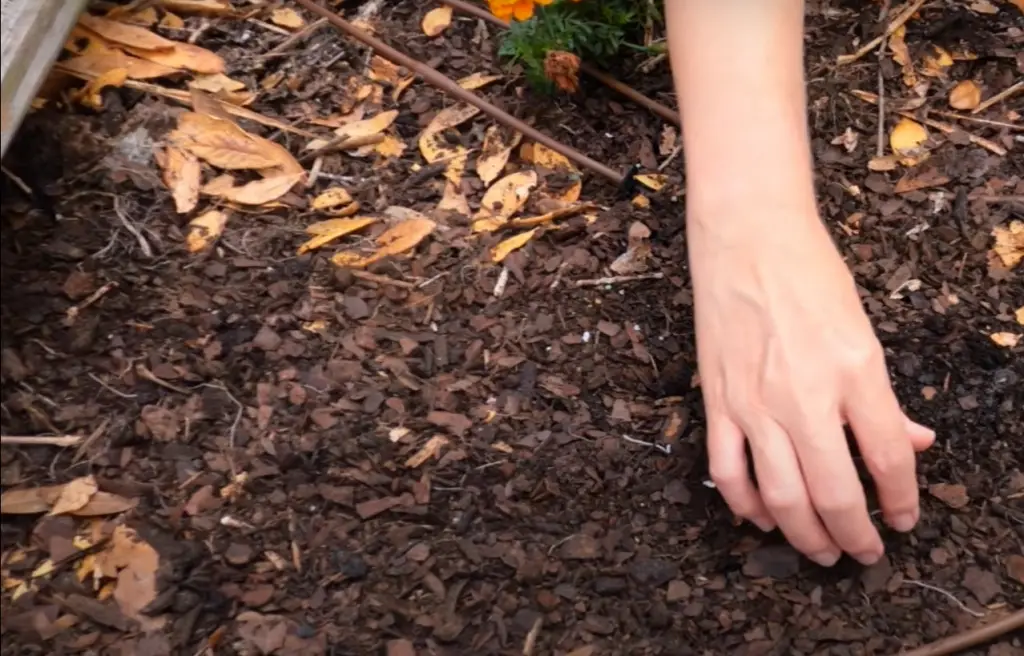
When choosing companion plants for arugula, look for ones that require similar soil conditions, light exposure and water needs. Consider pairing your arugula with other leafy greens such as kale or spinach. Aromatic herbs like parsley, thyme or oregano also make great companions. Other vegetables like tomatoes, carrots or radishes do well when planted near arugula. Flowering plants, such as nasturtiums or marigolds, can help deter pests and attract pollinators to your garden.
What Are The Benefits?
The benefits of planting companion plants alongside arugula are numerous. Not only do the companions bring color, texture and scent to your garden, they also help ward off pests and provide nutrients that can increase the health and yield of your arugula crop. Companion plants can attract beneficial insects such as bees and ladybugs which will naturally control pest populations in your garden. Additionally, certain plants have root systems that can help fix nitrogen or other essential minerals into the soil. This prevents nutrients from leaching away and allows other nearby plants to benefit from this increased nutrient availability. Finally, companion planting is a great way to reduce weeds by filling in open spaces in the garden where weed seeds could otherwise germinate.
All of these factors make for healthier, more productive gardens and plenty of delicious arugula! [1]
Good Arugula Companion Plants
Carrot (Daucus Carota)
Carrot makes excellent companion plants for Arugula as they attract pollinators, which in turn helps Arugula thrive and flourish. Carrots also produce a chemical that is attractive to beneficial insects, including those that prey on common garden pests. This helps keep your Arugula bed free from insect infestations while providing much needed nutrients to the soil.
Beets (Beta Vulgaris subs. vulgaris)
Beets are another excellent companion plant for Arugula. They help attract beneficial insects, including those that prey on common garden pests.
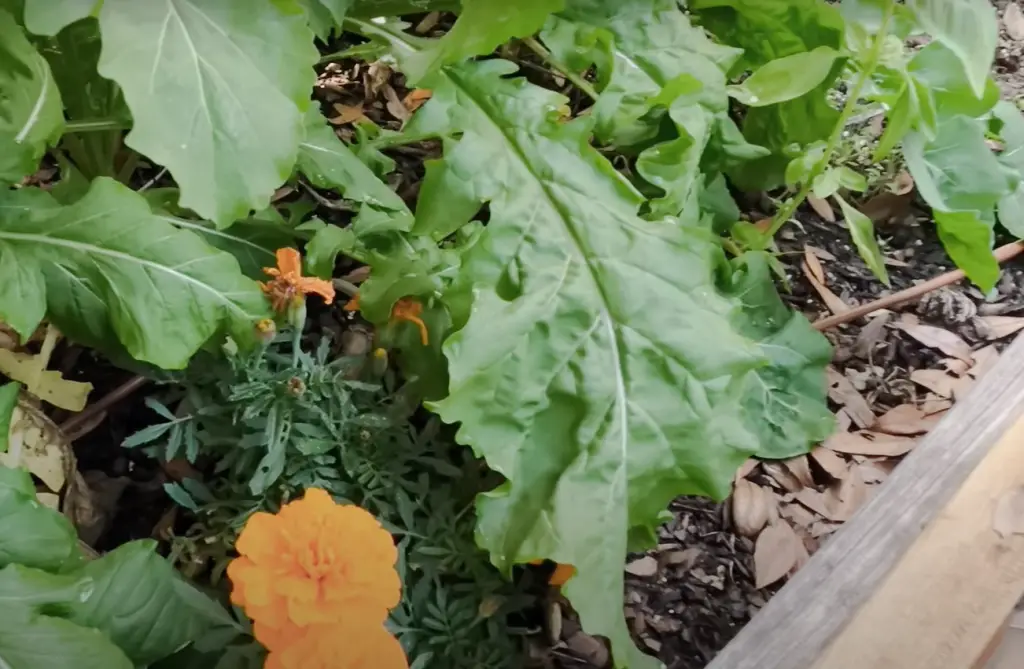
Beets also produce a chemical called glucotropaeolin which helps repel some common garden insects like slugs and aphids. Additionally, beets add valuable nutrients to the soil that can help ensure your Arugula stays healthy.
Onion (Allium Cepa)
It is an ideal companion plant for arugula. The onion’s strong smell helps to repel pests and beneficial insects such as ladybugs can help keep the aphids off of your arugula crop. Additionally, onion has a shallow root system that does not compete with the deep roots of arugula plants for nutrients and moisture.[2]
Garlic (Allium Sativum)
Garlic is another great companion for arugula. Its strong scent helps to repel insects and keeps them from damaging your crop. Additionally, garlic has a shallow root system that does not compete with the deep roots of arugula plants for nutrients and moisture. When planting garlic near arugula, make sure it gets plenty of sunlight as it needs 8 hours of direct light every day.
Swiss Chard (Beta Vulgaris var cicla)
Swiss chard is another ideal companion for arugula. Because it grows to a large size, it can help protect the smaller arugula plants from harsh weather. Additionally, Swiss chard has a deep root system that helps aerate the soil and pull up nutrients that may be lacking in your garden. When planting Swiss chard near arugula, make sure it gets plenty of sunlight as it needs 8 hours of direct light every day.
Spinach (Spinacia Oleracea)
It is one of the most popular companion plants for arugula. Spinach and arugula are both fast-growing, cool-season vegetables that benefit from being planted together.
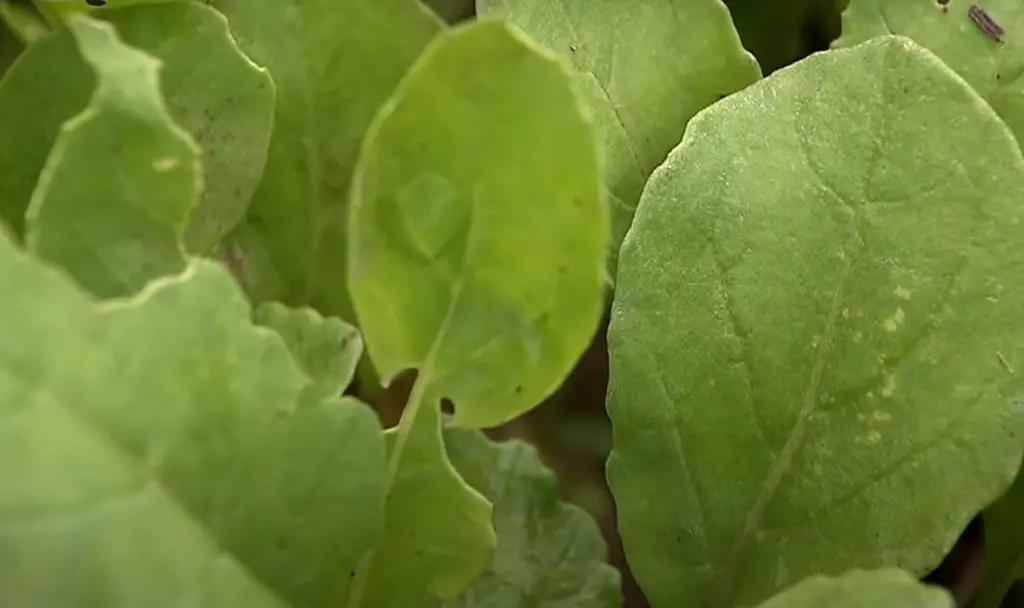
They offer similar growing conditions, such as moist soil and sunny locations with partial shade. By planting spinach alongside arugula, you can also reduce competition for light and nutrients, allowing each plant to receive more of what it needs to thrive. Additionally, spinach has small leaves that can act as a ground cover around the larger leaves of the arugula, helping to protect both plants from weeds.
Lettuce (Lactuca Sativa)
Lettuce is another popular companion plant for arugula. It grows best in moist soil and partial shade, similar to arugula, and has a shallow root system that won’t compete with the deeper roots of the arugula. The bright green leaves of lettuce will also add visual appeal to your garden beds. Additionally, both plants contain compounds that repel pests such as aphids and other insects, making them ideal companions when it comes to pest control.
Rosemary (Salvia Rosmarinus)
Rosemary is a fragrant herb that makes an excellent companion plant for arugula due to its pest-repelling properties. Its strong scent helps repel common garden pests, such as aphids and caterpillars, while also helping to attract beneficial insects like bees and butterflies. Additionally, rosemary can help improve soil quality by adding nitrogen and other vital nutrients to the soil. [3]
Thyme (Thymus Vulgaris)
It is a great companion to arugula. It helps to repel harmful insects and adds flavor to the salad greens.
Plant thyme around the edges of your garden or containers where arugula is growing as an effective pest deterrent.Dill (Anethum Graveolens)
Dill is a great companion for arugula and other herbs. It has a wide range of health benefits, including antifungal, antimicrobial, and anti-inflammatory properties. Plant dill around your arugula plants to act as a natural insect repellent. Dill will also attract beneficial insects such as bees to your garden or containers.
Parsley (Petroselinum Crispum)
It is an excellent companion plant for arugula. Parsley can be planted alongside arugula to add flavor and texture to salads. The parsley’s broad leaves provide shade, which helps keep the soil cool and moist for the arugula. Additionally, parsley has long tap roots that draw in essential nutrients from deeper levels of soil, which are then made available to the shallow-rooting arugula plants.
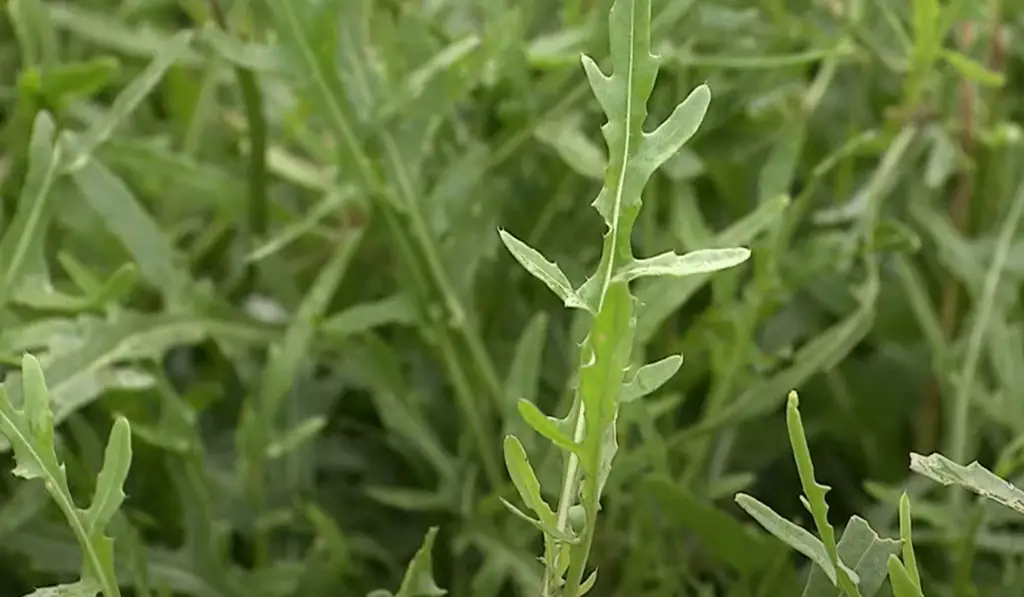
This makes it a great choice to rotate with other vegetables in the garden or as a living mulch around arugula beds. Parsley has antifungal properties that may also help protect the health of surrounding plants by preventing disease spread from one plant to another, including tomato blight and septoria leaf spot. Finally, parsley is a trap crop for carrot rust fly, which can damage arugula if left unchecked. Planting parsley around your arugula beds will help draw away pesky insects that could otherwise cause damage to the arugula plants.
Basil (Ocimum Basilicum)
Another great companion plant for arugula is basil. Basil’s strong, pungent aroma helps repel certain pests, such as aphids and beetles, that could otherwise feed on the arugula leaves. Basil also has antibacterial properties which can help prevent disease in nearby plants and its deep-rooted taproots bring up essential minerals from far below the surface of the soil, making them available to shallow-rooting arugula plants. In addition to its pest repellent qualities, basil also produces a compound called eugenol that attracts pollinators to nearby flowers and fruits, helping ensure proper pollination of other garden vegetation.
Chamomile (Matricaria Chamomilla)
Chamomile is an excellent companion plant for arugula as it helps protect the health of neighboring plants with its antibacterial and antifungal properties. Its small white flowers attract pollinators, such as bees and other beneficial insects that help keep pests away from arugula. Additionally, chamomile’s deep roots bring up essential nutrients from far below the surface of the soil, making them available to shallow-rooting arugula plants. Finally, chamomile has a calming fragrance which can help reduce stress in nearby garden vegetables and may even make them taste better. [4]
Nasturtium (Tropaeolum Majus)
It is an excellent companion for arugula. It has brightly colored flowers that attract pollinators, which increases the yield of arugula plants. Nasturtium also repels pests such as aphids and cucumber beetles, thus protecting arugula from damage. Furthermore, nasturtium releases a chemical into the soil that helps to suppress certain fungal diseases that can harm arugula. Planting nasturtium and arugula together will help create a healthy garden environment.
Petunias (Petunia spp.)
Petunias are another great companion plant for arugula. They add a splash of color to the garden and attract helpful pollinators, while their dense foliage provides good ground cover that helps reduce weed growth around arugula plants.

Petunias also emit a chemical from their roots that can help inhibit the growth of certain fungal diseases, making them beneficial in protecting arugula against disease.
Peas (Pisum Sativum)
Peas make great companion plants for arugula. Peas are cool-season annuals that thrive in the same soil, sun and moisture conditions as arugula, and their deep roots help to loosen hard soil around the arugula’s shallow roots. Planting peas near arugula also provides a nitrogen-rich environment ideal for optimal growth of both plants. Plant dwarf varieties of pea such as Little Marvel or Maestro to minimize competition for sunlight with tall-growing arugula plants.
Corn (Zea Mays)
Corn is another great companion for arugula. As a tall-growing annual, corn provides much needed shade to arugula plants during hot summer months. The nitrogen-rich soil in which both plants thrive also helps the corn and arugula grow strong and healthy. Plant dwarf varieties such as Honey ‘n Pearl or Early Sunglow if space is limited, as these varieties are shorter than traditional sweet corn varieties.
Bush beans (Phaseolus Vulgaris)
Bush beans are a great choice for growing with arugula as they are typically shorter and bushier than pole beans, thus taking up less space. They also provide nitrogen-rich soil to the surrounding area, helping both plants reach their full potential.
Celery (Apium Graveolens)
It is an excellent companion plant for arugula, as it helps to improve the flavor and texture of the leaves when planted together. Celery also helps to deter certain pests that may be attracted to arugula, such as aphids, slugs, and snails.
Borage (Borago Officinalis)
This herb is a great companion for arugula as it helps to attract beneficial pollinators such as bees and butterflies. Borage also helps to deter certain pests, like squash beetles, that may be attracted to the arugula plant.
Asparagus (Asparagus Officinalis)
It is a great companion plant for Arugula. Asparagus helps the soil retain moisture, making it a good choice for areas with dry climates or periods of drought. It also has high levels of nutrients in its foliage that can benefit other nearby plants, such as Arugula, and it provides a physical barrier to weeds and pests. Additionally, it attracts beneficial pollinators such as bees and butterflies which in turn help pollinate the flowers on your Arugula plants.
Chives (Allium Schoenoprasum)
Chives are another great companion plant for Arugula. Chives grow well in most soils and climates, and they have a subtle onion-like flavor that is favored by many gardeners. They also produce edible flowers which attract beneficial insects such as bees and butterflies to your garden.
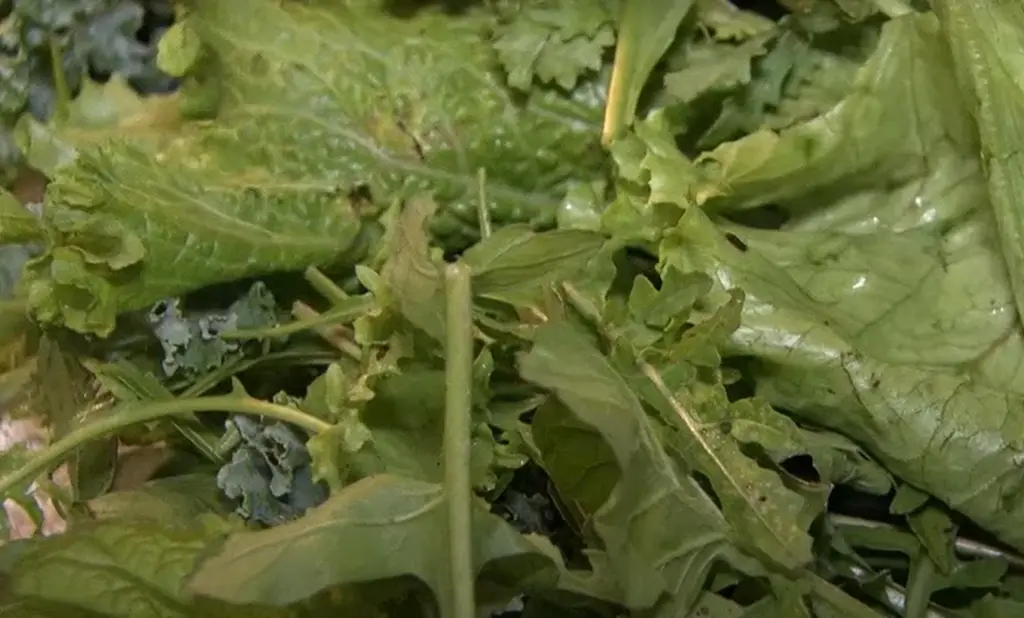
The presence of these pollinators will help ensure the health of your Arugula plants. Additionally, chives offer good winter protection from frost. Planting them alongside your Arugula can provide a layer of insulation for the roots during cold spells. [6]
Marigold (Tagetes spp.)
Marigolds are an ideal companion plant for Arugula. Their bright yellow and orange flowers attract pollinators that help increase the yield of your Arugula plants. They also have a pungent aroma which acts as a natural insect repellent, keeping pests away from your Arugula. Marigolds are easy to grow and require minimal maintenance; they thrive in most soils and climates, making them a great addition to any garden. Finally, marigolds have the added benefit of improving soil fertility by helping to break down organic matter into usable nutrients for other plants in your garden.
Mint (Mentha spp.)
Mint is a great companion plant for Arugula as it helps to repel some of the pests that can cause damage to your Arugula plants. The fragrant aroma of mint also attracts beneficial insects such as bees and butterflies which help to pollinate your Arugula flowers, resulting in greater yields. Mint grows quickly and requires little maintenance, making it an easy addition to any garden.
What Not To Plant With Arugula
It is important to remember that not all plants are suitable companions for Arugula. Avoid planting Brussels sprouts, cabbage, and cauliflower alongside your Arugula as they tend to compete for resources in the soil, such as water and nutrients. It is also advisable to keep a distance between Arugula and potatoes as they both prefer similar soils and growing conditions. [7]
Is Arugula Slow Growing?
Arugula is not usually considered a slow-growing plant. Generally, it takes about two to four weeks for arugula seeds to germinate and begin growing. After the initial germination, your arugula plants will grow quickly, reaching maturity in three or four weeks. Once mature, your arugula will be ready to harvest and can be harvested continuously for up to two months. For best results, it is important to regularly pick leaves from the plant in order to ensure steady growth. Arugula can also benefit from companion plants that provide shade and fertilizer while helping deter pests such as slugs and snails. Some recommended companion plants for arugula are spinach, chard, oregano, lavender, and parsley. These plants will help create a healthy and productive garden for your arugula to thrive in.
When it comes to planting arugula, timing is everything. Arugula prefers cooler weather so it is best planted outside after any danger of frost has passed. If temperatures remain cool then the plant may continue growing well into the summer months. Planting too early or late can cause the plant to bolt prematurely or not grow at all. To have success with your arugula crop make sure you plant it at the right time and provide plenty of water and fertilizer for optimal growth. With proper care, your arugula will be ready for harvest in no time! [8]
Is Arugula Heat Tolerant?
Yes, arugula is heat tolerant and can survive hotter temperatures than many other lettuces. It’s a popular choice for summer gardens because of its ability to tolerate the warmer weather.
You may also want to shade the plants during particularly hot days if possible. Additionally, you may find that succession planting – sowing small amounts every few weeks – helps ensure continual harvest throughout the season. With proper care and attention, arugula can provide delicious greens all summer long!When Should You Not Eat Arugula?
Although arugula is usually safe to eat, like most foods, there are a few situations where it should be avoided. Those with allergies to cruciferous vegetables should avoid eating arugula as this could lead to an allergic reaction. People with thyroid issues should also avoid eating large amounts of raw arugula on a regular basis due to its high concentration of goitrogens. Pregnant women and young children should also exercise caution when consuming large amounts of raw arugula as it contains oxalates which can interfere with the absorption of calcium. Lastly, if you have any gastrointestinal problems or acid reflux then eating raw arugula may worsen your symptoms. In these cases it is best to cook the arugula in order to make it easier on your digestive system. If you are looking for a crunchy salad green without the risk of adverse reactions, try using iceberg lettuce or romaine hearts instead.
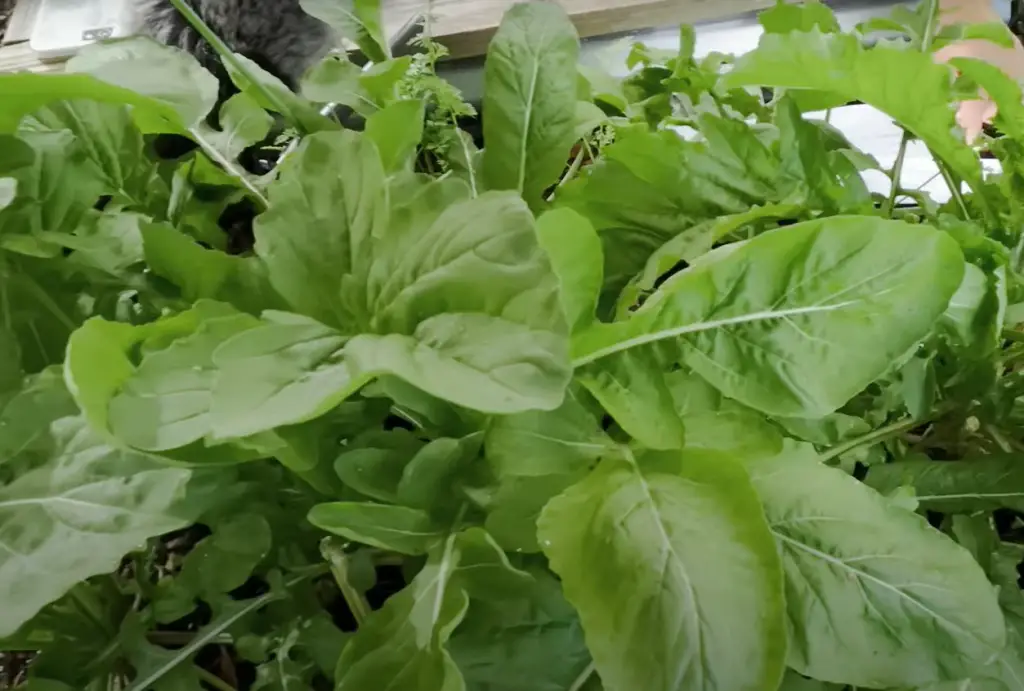
In conclusion, arugula is generally safe to eat and can be an excellent addition to salads and other dishes. However, due to its high oxalates content and goitrogenic properties, some people may experience adverse reactions from eating raw arugula. Those with allergies, thyroid concerns, gastrointestinal issues or acid reflux should exercise caution when consuming raw arugula. In these cases it is best to cook the greens before eating them. As always, check with your doctor prior to adding any new food into your diet.
FAQ
What can you not plant next to arugula?
It is not recommended to plant members of the Allium family, such as onions and garlic, next to arugula. These plants may compete for resources and create a less than ideal growing environment for both species. Additionally, it’s best to avoid planting other brassicas, like cabbage or broccoli alongside arugula; these vegetables typically require more space and will crowd out any companion plants that are planted too close by.
What types of herbs can be grown with arugula?
Herbs such as parsley, sage, thyme, oregano, cilantro and chives all make good companion plants for arugula. They can help repel common garden pests that could potentially damage your crop while also adding flavor and fragrance to your garden. Additionally, chamomile is a wonderful companion plant for arugula as it has been shown to increase essential oil content in the leaves of the vegetable.
What flowers are good companion plants for arugula?
Flowers such as marigolds, nasturtiums, and calendulas make great companion plants for arugula. Marigolds repel common pests while nasturtiums attract beneficial insects that help keep harmful ones at bay. Calendulas help naturally deter pests from attacking your crop and also introduce bright colors into your garden beds. All three of these flowers can be harvested or used as cut flowers in arrangements or bouquets.
Can broccoli and arugula be planted together?
Yes, broccoli and arugula can be planted together. Both of these vegetables have similar growing requirements, so they are an ideal companion planting combination. Arugula and broccoli both thrive in full sun or partial shade, and they need consistent moisture to produce a good harvest. Planting the two vegetables near each other will create a mutually beneficial environment where they can become more productive than if alone. The deep roots of the broccoli will help to aerate the soil while adding nitrogen-rich organic matter which is vital for the health of leafy greens such as arugula. Additionally, since both crops mature at different times throughout the season, you will be able to enjoy fresh harvests over an extended period. With their complementary flavors and textures, broccoli and arugula make an excellent combination to add to your garden.
Can you plant arugula next to lettuce?
Yes, you can! Both arugula and lettuce are cool-weather plants that don’t require a lot of space or attention, making them ideal companions for each other. They both prefer the same growing conditions—light, well-draining soil in an area with partial sun. Arugula will benefit from having lettuce nearby as they help to keep moisture in the soil and provide some shade so that the leaves don’t get too hot during midday. Additionally, planting them together will also reduce your chances of insect damage as certain pests like cabbage loopers will be deterred by the presence of lettuce. Just make sure to give each plant enough room to grow without overcrowding them!
Useful Video: Growing Arugula From Seed to Harvest
Conclusion
Arugula is an easy-to-grow plant with a few important considerations in mind. It requires good drainage, consistent moisture, and partial shade to full sun. Planting companions will help keep your arugula healthy by providing protection from pests, improving soil quality, and enhancing the overall flavor of the leaves. Herbs such as basil, dill, mint, oregano, rosemary, sage, and thyme make excellent companion plants for arugula. Marigold flowers are also beneficial because they can repel insects that may otherwise damage the plant or its yield. All these plants have different needs so be sure to research them thoroughly before planting in order to ensure successful growth and harvests. With a little bit of knowledge and care, you can have a healthy garden full of delicious arugula in no time!
References:
- https://www.epicgardening.com/arugula-companion-plants/
- https://borealbloomhomestead.com/arugula-companion-plants/
- https://www.backyardgardenlover.com/companion-plants-for-arugula/
- https://nicksgardencenter.com/gardening-blog/plants/arugula/
- https://www.gardenerbasics.com/blog/arugula-companion-plants
- https://positivebloom.com/arugula-companion-plants/
- https://balconygardenweb.com/best-arugula-companion-plants/
- https://www.plantssparkjoy.com/arugula-companion-plants/





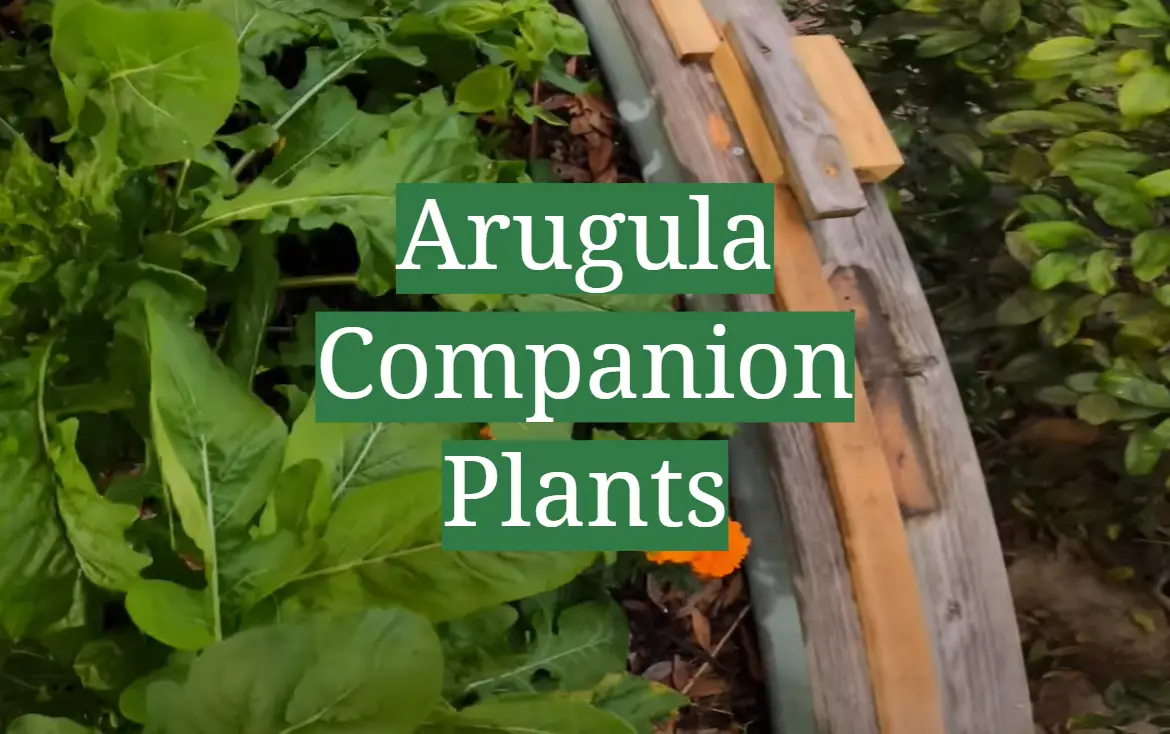




Leave a Reply
View Comments